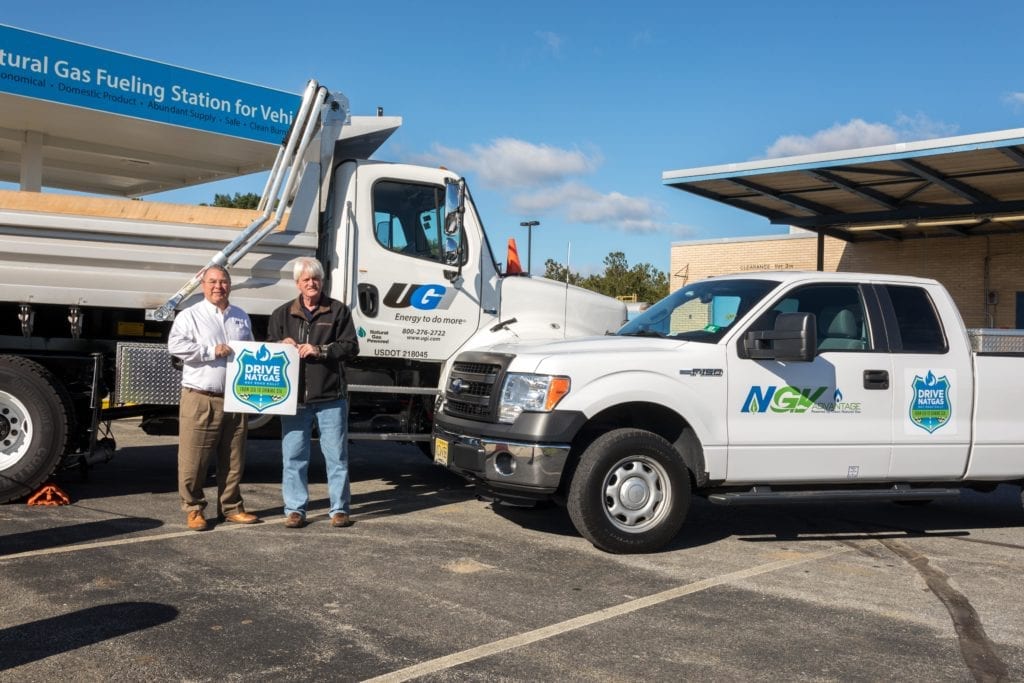Last month, NGVAmerica proudly launched the 2018 Drive Natural Gas Coast-to-Coast Road Rally, a four week, 5,000+ mile, 14 stop cross-country excursion highlighting the benefits of natural gas use in transportation. The rally began on the East Coast and will be concluding at the start of the NGVAmerica 30th Anniversary Annual Meeting and Industry Summit in Palm Springs, California on November 14th. We hope that, along with our partners across the country, we can put more natural gas vehicles (NGVs) in America’s communities and highways.
As a low-cost domestic fuel option, natural gas is an American solution, delivering one of the most cost-effective ways to reduce transportation-related pollutants currently available in vehicle powertrain options today. The added bonus is that when fueled by renewable natural gas (RNG) captured from agricultural, food, landfill, or wastewater waste, even greater CO2 and greenhouse gas emission reductions are achieved, helping to clean our cities and improve the environment. With RNG, the fuel becomes carbon neutral or even carbon negative.
Natural gas is a low-cost domestic fuel option, delivering one of the most cost-effective ways to reduce transportation-related pollutants.
Natural gas delivers a variety of vehicle choices with many emission benefits for the investment. NGVs have long been the choice of fleet managers interested in escaping the volatility of ever-changing diesel and gasoline prices.
As a transportation fuel, natural gas is sustainable, adaptive, and competitive across all vehicle classes. Natural gas currently powers passenger vehicles, medium-duty work vehicles, short- and long-haul trucks, school buses, transit buses and shuttles, refuse trucks, construction and mining equipment, marine vessels, and locomotives.
Natural Gas is Affordable
Unlike oil and petroleum-based fuels, natural gas enjoys significant price stability over time, while delivering cost-effective NOx emissions reductions.
Natural Gas is Abundant and Domestic
Almost 98% of all natural gas consumed in the U.S. is produced in the U.S., and domestic reserves of natural gas are estimated to be twice that of oil, based on current consumption – more than 100 years.
RNG captured from agricultural, food, landfill or wastewater waste means even greater CO2 and GHG emission reductions when used to fuel vehicles.
Natural Gas is Widely Available
With a well-established and growing infrastructure of 2,000+ CNG and LNG fueling stations, along with 2.5 million miles of pipeline, natural gas fuel is easily accessible.
Natural Gas Contributes to our Nation’s Energy Security
Displacing diesel with natural gas reduces our reliance on petroleum-based fuels. Existing natural gas infrastructure can accommodate a spike in demand for transportation uses. And unlike traditional fuels, a spike in demand for NGVs won’t negatively impact residential energy rates.
Natural Gas is Cost Effective and Reduces Maintenance Costs
Its lack of lead means no fouling of spark plugs; and crankcase oil does not become diluted or contaminated. Natural gas is cleaner burning, extending intervals between oil changes and tune ups, and does not react to metal, making it less corrosive. It is common for heavy-duty NGVs to run 1 million miles or more without reconditioning.
NGVs are Sustainable with the Cleanest Medium- and Heavy-duty Powertrains Emitting Almost no Emissions
The cleanest truck engines in the world that are commercially available today are powered by natural gas. The Cummins Westport Ultra-Low NOx engine – made in America – is 90% cleaner than the EPA’s current NOx standard and 90% cleaner than its latest available diesel engine counterpart.
NGVAmerica calls on every level of government to pass legislation favoring natural gas and NGVs in order to reduce transportation-related pollutants.
This technology is available for sale here in the United States right now, not in a projected five or even ten years, as other vehicle technologies can only estimate today. The Cummins Westport product is certified by EPA and CARB to a 0.02 grams per brake horsepower hour (g/bhp-hr) standard, making it a zero-emission equivalent (ZEE). When renewable natural gas is used to fuel it, even greater CO2 and GHG emission reductions are achieved, up to 125% lower than diesel.
NGVs are powered by American fuel, American technology, and American innovation. They have the cleanest well-to-wheels emissions profile of any fuel on the market today, and NGVs are making a difference through a variety of applications – trucks, trash, transit, and even marine and rail.
The bottom line is simple: Our ever-growing population has put an incredible burden on the need to provide solutions to transit people, our goods and our refuse. Emissions, particularly urban emissions, have a major impact on public health. Currently 4 out of every 10 Americans live in areas with air that is unhealthy to breathe.
NGVAmerica calls on our partners at every level of government to consider passing legislation that makes the use of natural gas and NGVs a priority so we can create a more environmentally-conscious transportation system.
NGVAmerica looks forward to the final weeks of our road rally and a very successful annual meeting from November 13th-16th. To learn more, visit ngvshow.com.


